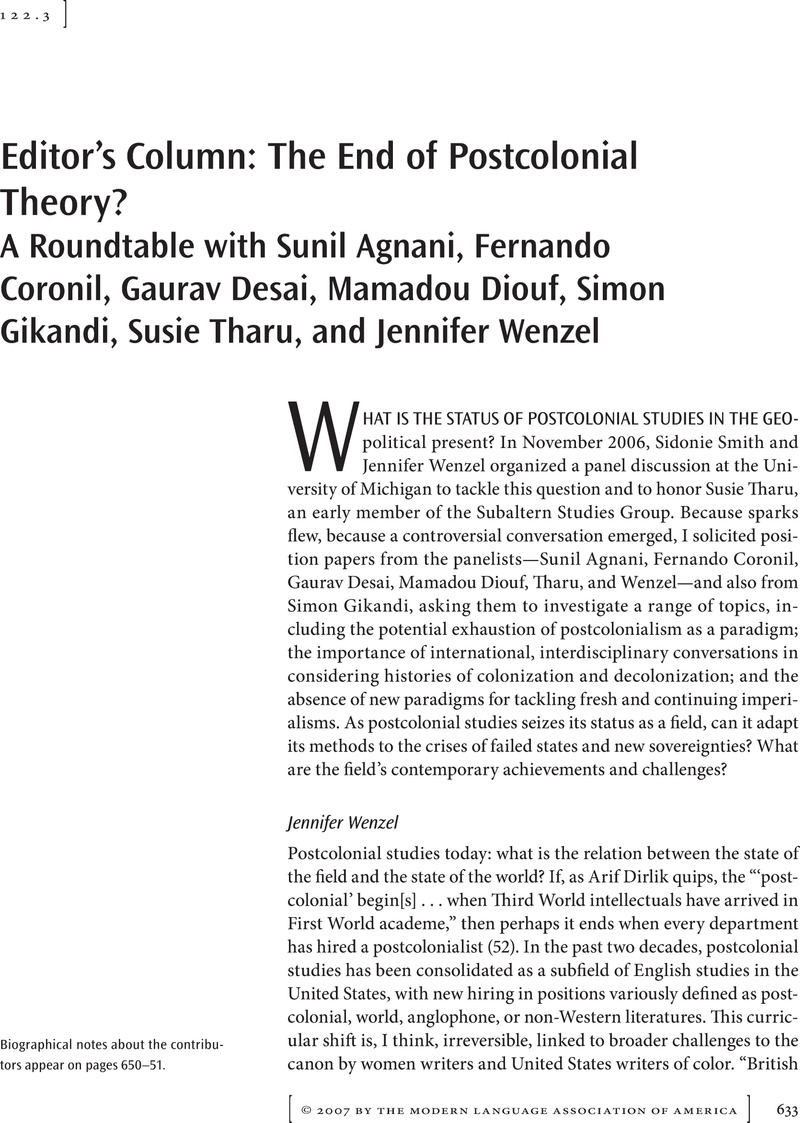Crossref Citations
This article has been cited by the following publications. This list is generated based on data provided by Crossref.
Gyssels, Kathleen
2007.
Les crises du « postcolonial » ? Pour une approche comparative.
Revue internationale de politique comparée,
Vol. Vol. 14,
Issue. 1,
p.
151.
Hargreaves, Alec G
and
Moura, Jean-Marc
2007.
Editorial introduction Extending the boundaries of francophone postcolonial studies.
International Journal of Francophone Studies,
Vol. 10,
Issue. 3,
p.
307.
Watts, Richard
2008.
Towards an ecocritical postcolonialism: Val Plumwood’sEnvironmental Culturein dialogue with Patrick Chamoiseau.
Journal of Postcolonial Writing,
Vol. 44,
Issue. 3,
p.
251.
Hargreaves, Alec G.
and
Murphy, David
2008.
Introduction: New Directions in Postcolonial Studies.
Journal of Postcolonial Writing,
Vol. 44,
Issue. 3,
p.
221.
Ravi, Srilata
2011.
Engaging the Postcolonial: Terrorism, Tourism, and Literary Cosmopolitanism in the Twenty-First Century.
International Journal of Canadian Studies,
p.
215.
Jaime Hanneken
2012.
José Carlos Mariátegui and the Time of Myth.
Cultural Critique,
Vol. 81,
Issue. ,
p.
1.
Quayson, Ato
2012.
The Cambridge History of Postcolonial Literature.
Albrecht, Monika
2013.
Comparative Literature and Postcolonial Studies Revisited. Reflections in Light of Recent Transitions in the Fields of Postcolonial Studies.
Comparative Critical Studies,
Vol. 10,
Issue. 1,
p.
47.
Schulze-Engler, Frank
2015.
Reworking Postcolonialism.
p.
19.
Boyagoda, Randy
2015.
The New Cambridge Companion to William Faulkner.
p.
204.
Marzagora, Sara
2016.
The humanism of reconstruction: African intellectuals, decolonial critical theory and the opposition to the ‘posts’ (postmodernism, poststructuralism, postcolonialism).
Journal of African Cultural Studies,
Vol. 28,
Issue. 2,
p.
161.
2016.
Duress.
p.
381.
Millar, Stephen R.
2017.
Irish Republican Music and (Post)colonial Schizophrenia.
Popular Music and Society,
Vol. 40,
Issue. 1,
p.
75.
Adejunmobi, Moradewun
2017.
Native Books and the “English Book”.
PMLA/Publications of the Modern Language Association of America,
Vol. 132,
Issue. 1,
p.
135.
Lutzoni, Silvia
2017.
Jhumpa Lahiri and the Grammar of a Multi-Layered Identity.
Journal of Intercultural Studies,
Vol. 38,
Issue. 1,
p.
108.
Sinha, Subir
and
Varma, Rashmi
2017.
Marxism and Postcolonial Theory: What’s Left of the Debate?.
Critical Sociology,
Vol. 43,
Issue. 4-5,
p.
545.
Cleary, Joe
2018.
After Said.
p.
129.
Millar, Stephen R.
2018.
Popular Music and the Postcolonial.
p.
75.
Srinivasan, Ragini Tharoor
2018.
Introduction: South Asia from Postcolonial to World Anglophone.
Interventions,
Vol. 20,
Issue. 3,
p.
309.
Desai, Gaurav
2018.
Response.
Interventions,
Vol. 20,
Issue. 3,
p.
354.



